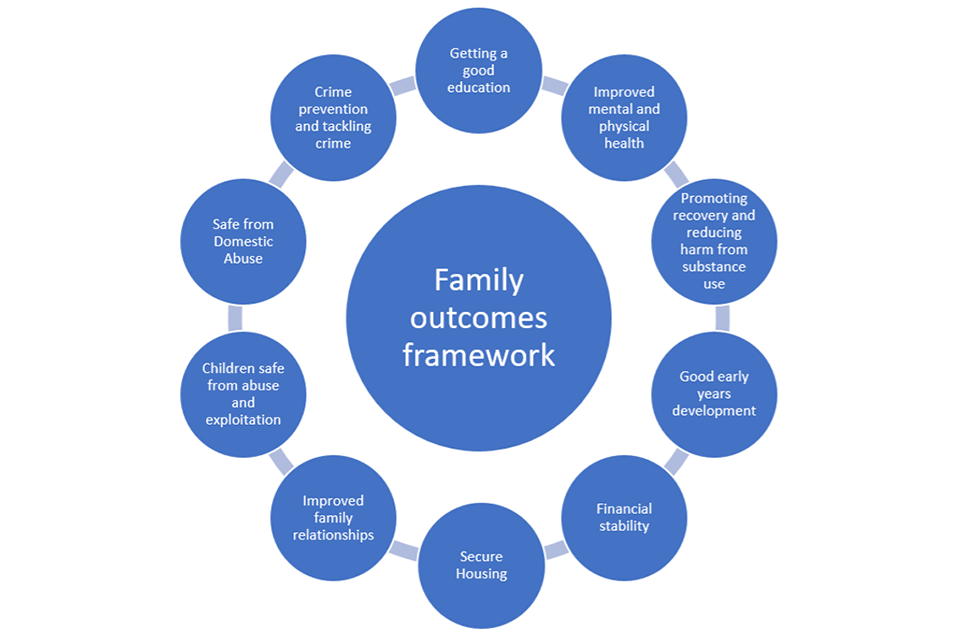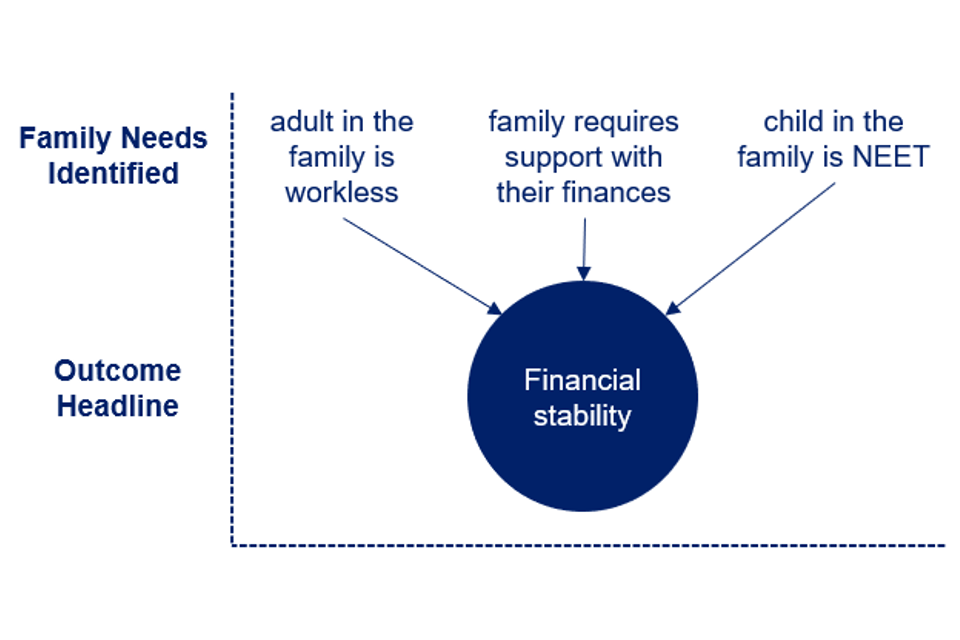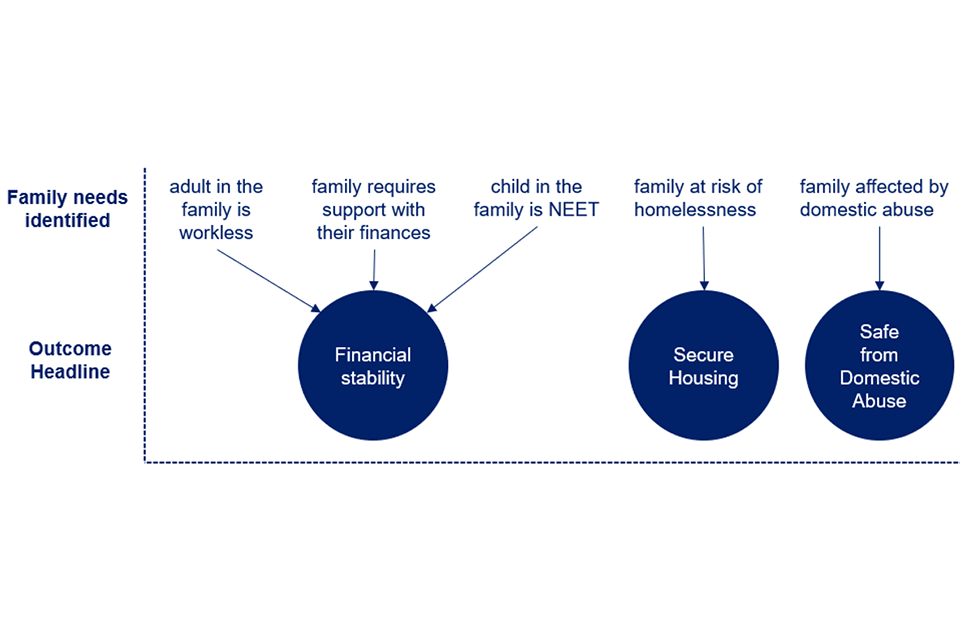Chapter 4: Identifying and working with families
Published 2 April 2022
Applies to England
Supporting Families programme guidance 2022 to 2025
What does this document cover?
Guidance relating to the delivery of Supporting Families in 2022-25
Who is it for?
Intended for use by local authority Supporting Families teams and their partners, auditors and analysts.
Identifying families
Supporting Families led the way by being first to systematically identify families with multiple high cost problems who could benefit from earlier and better coordinated support.
Although all families who require support will benefit from a whole family approach a number of requirements must be met if payment funding is to be claimed for successful family outcomes.
The national Supporting Families Outcomes Framework sets out ten headline outcomes. Below these outcomes sit descriptors of the family needs that make up the eligibility criteria for the Supporting Families programme, as well as suggested data sources for identifying families with these needs.
To be eligible for a results payment under Supporting Families, each family must include dependent children and/or expectant parents. Each family must also demonstrate a minimum of three eligibility criteria or family needs as set out in the national Supporting Families Outcomes Framework.

The 10 headline outcomes are:
- Getting a good education
- Good early years development
- Improved mental and physical health
- Better managed substance use
- Improved family relationships
- Children safe from abuse and exploitation
- Families diverted from crime
- Safe from domestic abuse
- Secure housing
- Financial stability
Identifying and evidencing family need
To make a claim for a successful family outcome it must first be evidenced that a family meet the eligibility criteria for the programme and that at least three family needs are present. This must also be evidenced during assurance reviews and visits.
For a family to be eligible for the Supporting Families programme the family needs identified must fall under three separate outcome headlines. For example, a family may require support with their finances, there may also be a child in the family who is NEET and an adult in the family who is workless. However, all three of these needs fall under the financial stability headline outcome and therefore would not be eligible.

In this instance, two further family needs under two separate headline outcomes must be evidenced before it can be demonstrated that a family is eligible for the programme.

The national Supporting Families Outcomes Framework also recognises that many family needs are interlinked and may impact each member of the family differently. For example, where a family is affected by domestic abuse, this might affect members of the family differently; adults and children might require different, specialist support. It is important that every family need is identified and evidenced in each case, and that the required outcomes are achieved against each identified family need.
It is possible that a particular family need could be used as a criteria for more than one headline outcome. However, as a general rule, local authorities should avoid using a single problem to meet several headline outcomes. For example, a child in the family may require support with their physical health needs. This is an identifying need under the national outcome ‘improved mental and physical health’. However, the same need should not then be used to evidence a second eligibility criteria, for example the family need (as set out under the headline ‘good early years development’) ‘Child (0-5 yrs) physical health needs not met’. These are distinct and separate family needs and as such it should be clearly evidenced which family need is present and which outcome is being worked towards. Where a particular problem affects members of the family differently, for example the other child in the family is an unsupported young carer because of their sibling’s physical health needs, these can be recorded separately. But work must be done to achieve both relevant outcomes.
While families may be identified as eligible for Supporting Families on the basis of three eligibility criteria, the information available at the point of identification may not reflect the entirety of each family’s complex needs. Some needs, such as domestic abuse or mental illness, may be hidden until work begins with the family and the full extent of their needs are uncovered. In the first phase of the programme, families who met three eligibility criteria were found, on average, to have nine significant problems at identification.
The formula for identifying families allows for a level of discretion which should be exercised reasonably. Local authorities should identify families across all ten headline outcomes and make sure resources are being used to best effect. Local authorities are expected to be using Supporting Families to drive new ways of working across a broad and complex cohort of families so their approach to identification should reflect this ambition.
Timeframe for identifying families
It is best practice to identify eligible families at the point of referral or shortly after support begins. However, local authorities may also wish to identify families during the intervention as lead practitioners work with families and gain a better understanding of their needs. To make sure that all families considered eligible for the programme receive a whole family approach as set out in this guidance, families should only be identified as eligible, and a subsequent claim made, if they have been open to services in the two years prior to claim.
Before referral: Needs analysis may allow areas to identify families before they are referred to a service
At the point of referral: If areas are not currently doing needs analysis, best practice would be to identify family needs at the point of referral and confirm eligibility for the programme
At the assessment stage: The assessment process will normally clarify family needs and add more, these should be recorded, and families reassessed for eligibility
At the review stage: Eligibility could be reassessed at each review point as needs might change/emerge
At the point of submitting a successful outcome: Before submitting a successful outcome, eligibility should be checked
Age thresholds for eligibility and measuring results
Supporting Families aims to provide earlier support to families experiencing difficulties and improve outcomes for children; all eligible families must include dependent children or expectant parents.
For the purposes of Supporting Families, a dependent child is a person aged 0-15 or aged 16-18 and in full-time education and/or training and/or unemployed and living with their family.
| Family Need | Age Threshold |
|---|---|
| If a child is involved in crime or anti-social behaviour… | …the relevant family member should be between 10* and 18 years old. If 18 or over, the family member is considered an adult for these purposes. |
| If a child or young person has not been attending school regularly… | …the relevant family member should be in suitable full-time education, if the child is under 16 years old.** This rises to 25 years old if the child or young person has an Education, Health and Care plan or currently has a statement of special educational needs. |
| If a young person is not in education, training or employment… | …the relevant family member should be 16-18 years old. |
| Where a family need is identified under the headline outcome ‘good early years development… | …the relevant family member should be 0-5 years old |
| If an adult is in receipt of out of work benefits; or an adult is claiming Universal Credit … | …the relevant family member should be 18 years or over. However, there are a small number of exceptions whereby 16 and 17 year olds can claim the following benefits under specific circumstances: Universal Credit, Jobseeker’s Allowance, Employment and Support allowance and Carer’s Allowance. |
| If a person is experiencing or perpetrating domestic violence … | …the relevant family member should be 16 years old or over. If under 16 years old, violence or abuse captured as part of the headline outcome improved family relationships |
| Where a child specific family need not listed above is identified… | …the relevant family member should be under 18 years old. This rises to 25 years old if the child or young person has an Education, Health and Care plan or currently has a statement of special educational needs. |
*See Age of criminal responsibility.
**or last Friday in June if they will turn 16 by the end of the school holidays.
Working with families
The programme requires an integrated, whole family approach when working with families.
There is no, single template as each family will need a different approach depending on their circumstances. Every local authority and their partners will also choose to deliver their services differently to suit their local context. However, the following four principles capture what the national Supporting Families Team mean by ‘working with a family as part of Supporting Families’.
These principles must apply to all families declared as worked with and for whom a claim is made:
- there will have been an assessment that takes into account the needs and voice of the whole family;
- there is an action plan that takes account of all (relevant) family members;
- there is a lead practitioner for the family that is recognised by the family and other professionals involved with the family; and
- the objectives in the family action plan are aligned the national Supporting Families Outcomes Framework.
When a family no longer requires the same level of support and a practitioner is closing their case, they should reflect on the significant progress of the whole family against all their needs, ideally through a closure statement. A closure statement is not a requirement for a Payment by Results claim, but a good closure statement provides assurance that significant and sustained progress has been made. It should:
- look at all family members;
- look at all identified needs;
- summarise what work happened with the family;
- summarise the improvements made; and
- quantifies the needs and outcomes achieved with families
- confirms that, in the practitioner’s and supervising manager’s judgement, the progress made is significant.
All successful outcome claims need to evidence the outcomes are both achieved and sustained. A closure statement which provides details of the outcomes achieved can reduce the amount of retrospective checking required when submitting a claim at a later date. Areas will still need to check that outcomes have been sustained since the family’s case was closed.
Refugee or asylum resettlement programmes
If a family has been part of a resettlement programme, we would not expect them to be included within the families claimed for through Supporting Families. Public funding has already been made available for these families via the relevant resettlement programme.
Although these families are not eligible for a results payment under Supporting Families, this should not have a bearing on the service that the family receive, which should be tailored to their needs. Further guidance on this in due course, should circumstances change.
Families with no recourse to public funds
A family with no recourse to public funds (NRPF) would not – subject to the guidance below – necessarily be prevented from receiving support through Supporting Families. This includes employment support for NRPF families with leave to remain in the UK and permission to work here. But the employment and other support offered by Supporting Families is unlikely to be appropriate where the family with NRPF is here unlawfully and should be leaving the UK.
Any employment support provided by Supporting Families Employment Advisors, will be in line with the principles followed by Jobcentre Plus Work Coaches. That is, to advise those with NRPF, with permission to work in the UK, what employment networks, help and further support is available in their area. Employment support is distinct from any benefit payments in respect of welfare and housing.
Local authorities are reminded that any support provided to NRPF families through Supporting Families:
1. Must not be in breach of any immigration conditions imposed on them (e.g., in respect to employment).
2. Must be in accordance with Schedule 3 to the Nationality, Immigration and Asylum Act 2002, which restricts access to local authority support for families without immigration status.
Under Schedule 3 to the Nationality, Immigration and Asylum Act 2002, the following categories are prevented from receiving local authority support or assistance:
- A person with refugee status granted by a European Economic Area (EEA) country and any dependants;
- Refused asylum seekers who have failed to comply with removal directions and any dependants;
- A person unlawfully present in the UK (including visa overstayers, illegal entrants and refused asylum seekers who claimed asylum in country, rather than at port of entry); and
- A refused asylum seeking family the Home Office has issued with certification confirming that they have failed to take steps to leave the UK voluntarily.
Local authorities are not prevented from providing support and assistance to the categories listed above where this is necessary to avoid a breach of human rights. However, given the intensive and complex forms of support offered by Supporting Families, it is not anticipated that Supporting Families resources will be required for this purpose.
Local authorities with access to the NRPF Connect database, a secure web-based database, can use this system to contact the Home Office. Access can be arranged by contacting the NRPF network on the following email address: nrpf@islington.gov.uk. Local authorities without access to this system can contact the Home Office directly via the Status, Verification, Enquires and Checking email address: ICESSVECWorkflow@homeoffice.gsi.gov.uk. Both methods can be used to seek advice and information in respect of a person’s immigration status and local authorities are encouraged to do so if there is any uncertainty.
Immigration Enforcement can provide access to a chargeable enhanced service to support local authority decision making. The Checking and Advice service offers on-site assistance, training sessions and access to a real-time immigration status check telephone line. To find out more, please contact the team on the following email address: IE-CAS@homeoffice.gov.uk.
The Home Office is able to provide assistance to families who wish to return to their home country through the Voluntary Returns Service. The VRS will support families who have made an unsuccessful asylum claim and have subsequently decided to return home voluntarily, as well as those currently claiming asylum who have decided that they no longer wish to continue with their asylum application. New applications for VRS can be made through the on-line referral process: Get help to return home if you’re a migrant in the UK or by calling the VRS on 0300 004 0202.
